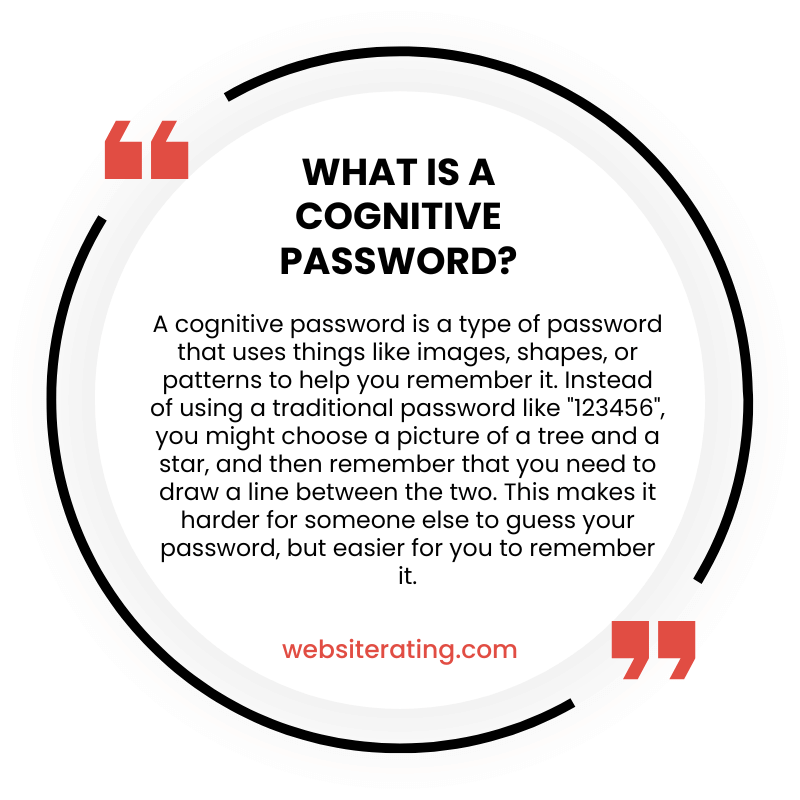Password security is of utmost importance in today’s digital world. As such, it is critical for individuals to understand the different types of passwords available and how they can work to protect their accounts or data.

One type of password that has recently been developed is a cognitive password, which uses biometrics to authenticate users. In this article, we will discuss what a cognitive password is, how it works, and the benefits it offers.
We will also provide practical examples for beginners who are considering using this type of password manager.
What is a Cognitive Password?
A cognitive password is a type of security measure utilized in order to protect sensitive information and data. It is based on the concept of utilizing an individual’s mental faculties as part of the authentication process for accessing secure accounts.
An example would be a system that requires users to answer a series of questions about personal facts such as the user’s mother’s maiden name, or the street they grew up on. The answers are often not stored anywhere, but instead require individuals to remember them well enough to access their accounts.
The main advantage of using cognitive passwords is that they can provide an extra layer of protection against hackers who may attempt to gain access to secure accounts by guessing or “brute forcing” passwords. As long as the user retains knowledge of their answers, hacking attempts become much more difficult since attackers cannot simply guess credentials from a database like they could with traditional passwords. Additionally, cognitive passwords can also be used in tandem with other types of authentication processes such as two-factor authentication for added layers of security.
How Does a Cognitive Password Work?
The intricacies of a cognitive password system are explored in this section, unveiling the effectiveness of its security measures. A cognitive password is an advanced form of authentication that uses biometric data to verify a user’s identity. It usually involves an algorithm that captures or stores personal information such as fingerprint scans, iris patterns and voice recognition. This data is then compared with the existing records to authenticate the user’s access.
The psychological aspect of a cognitive password makes it difficult for hackers to gain access because they must be aware of the users’ behavioral patterns and other psychological markers. The algorithm can detect any deviation from these patterns, alerting the user when something is out-of-the-ordinary or suspicious activity occurs.
Additionally, if there are multiple attempts at guessing passwords, the system will lock itself down until further verification is provided by either the user or an authorized administrator. By utilizing this multi-layered approach, cognitive passwords provide greater security than traditional passwords alone and help protect against unauthorized access to sensitive information.
Benefits of a Cognitive Password
Cognitive passwords offer a host of advantages in terms of security and user convenience. Cognitive passwords are designed to be more secure than traditional password systems as they require multiple authentication factors. This means that, even if the attacker knows the username and password combination, they will still need additional information to gain access.
Furthermore, cognitive passwords are highly resistant to brute force attacks since the system requires a different authentication factor for each attempt.
The use of cognitive passwords also allows users to create stronger, more complex passwords which can make them much less vulnerable to attack. By using strong, unique passwords for each account or application – and storing them securely with a password manager – users can ensure their data remains secure without having to remember dozens of complicated passwords themselves.
This increased level of security is beneficial both for individuals and businesses who want to protect their sensitive information from unauthorized access.
Summary
Cognitive passwords offer a unique security solution to users who wish to keep their accounts safe. They are based on the idea of using personal information that is more difficult for attackers to guess.
By implementing cognitive passwords, users can be sure that their accounts are protected from malicious activities. Additionally, cognitive passwords provide an added layer of protection against phishing attacks and other online threats.
Cognitive passwords are an effective way of securing user data and protecting against unauthorized access. With the help of this technology, users can rest assured that their accounts remain safe and secure at all times.
More reading
A Cognitive Password is a type of password system that uses personal, fact-based, or opinion-based questions to authenticate a user. Unlike traditional passwords, which can be difficult to remember and easy to guess, cognitive passwords are designed to be memorable and secure. They are often used as a form of secondary access and have been researched for many years (source: Wikipedia).
